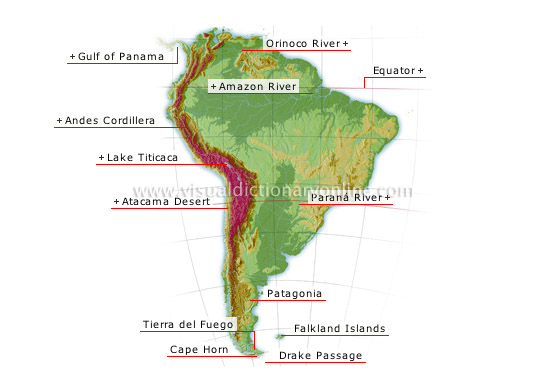South America
Linked to North America by Central America, its main features are the Andes Cordillera in the west and the plains and plateaus of the central and eastern regions.
Gulf of Panama 
Bounded in the north by the Isthmus of Panama, its coast is uneven and dotted with islands.
Andes Cordillera 
Longest mountain chain in the world (5,000 mi) and the second highest, it follows the western coast of South America; its highest peak is Aconcagua (22,834 feet).
Lake Titicaca 
Located in the Andes Cordillera between Peru and Bolivia; at an elevation of 12,500 feet, it is the highest navigable lake in the world.
Atacama Desert 
Among the driest deserts on the planet, receiving only a few inches of rain per year.
Tierra del Fuego 
Archipelago separated from the continent by the Magellan Strait; its cold damp climate results in perpetual snows from as low as 2,300 feet.
Cape Horn 
Southernmost point of South America, only 620 mi from Antarctica; famous for its storms and dangerous reefs and shoals.
Drake Passage 
Almost 560 mi wide, it separates Tierra del Fuego from Antarctica and connects the Atlantic to the Pacific; its currents are very powerful.
Falkland Islands 
Archipelago composed of two main islands separated by the Falkland Strait, as well as some 100 islets.
Patagonia 
Plateau in Chile and Argentina; it is divided into Andean Patagonia with a humid climate and abundant vegetation, and the Patagonian plateau, which is dry and sparse.
Paraná River 
River (1,860 mi) with most of its course in Brazil; it marks the boundary between Brazil and Paraguay, and between Paraguay and Argentina.
Equator 
Imaginary circle surrounding Earth at its widest circumference, dividing it into two hemispheres: the Northern hemisphere and the Southern hemisphere.
Amazon River 
The largest river in the world in volume of flow; it rises in the Andes and flows for 4,090 mi through more than 80% of Brazil’s territory.
Orinoco River 
River in Venezuela (1,340 mi) that empties into the Atlantic through a vast delta; the volume of its flow is considerable.
















